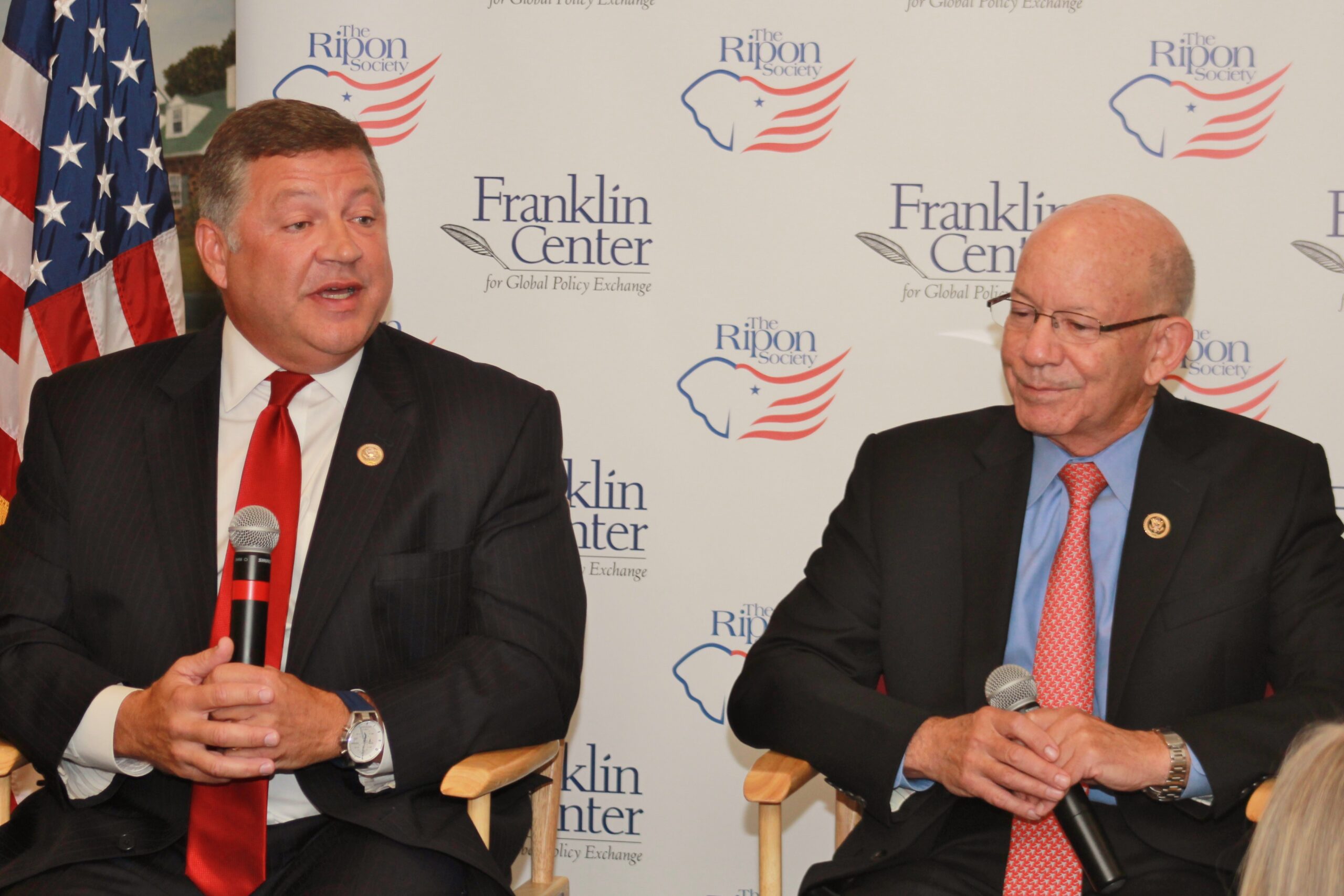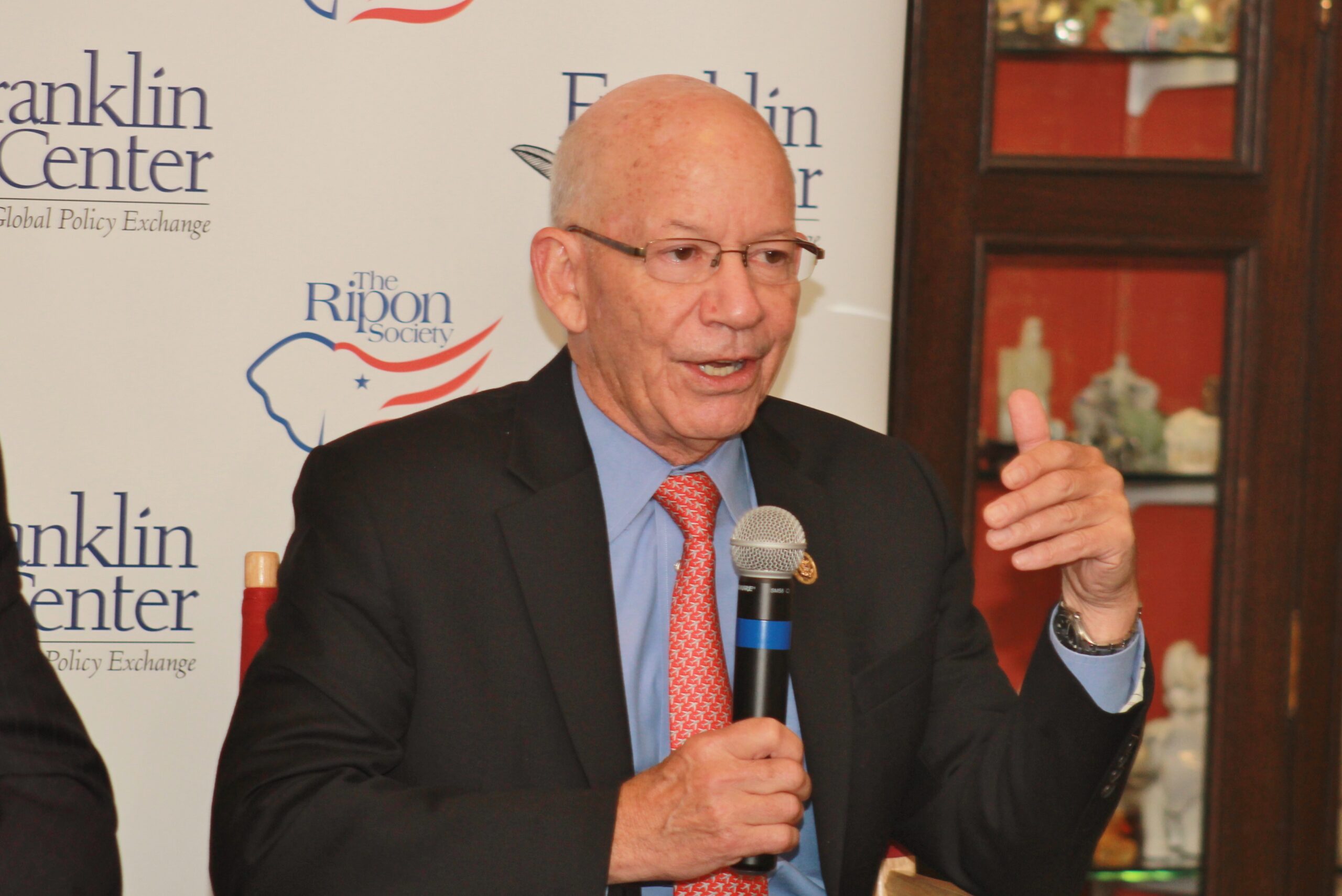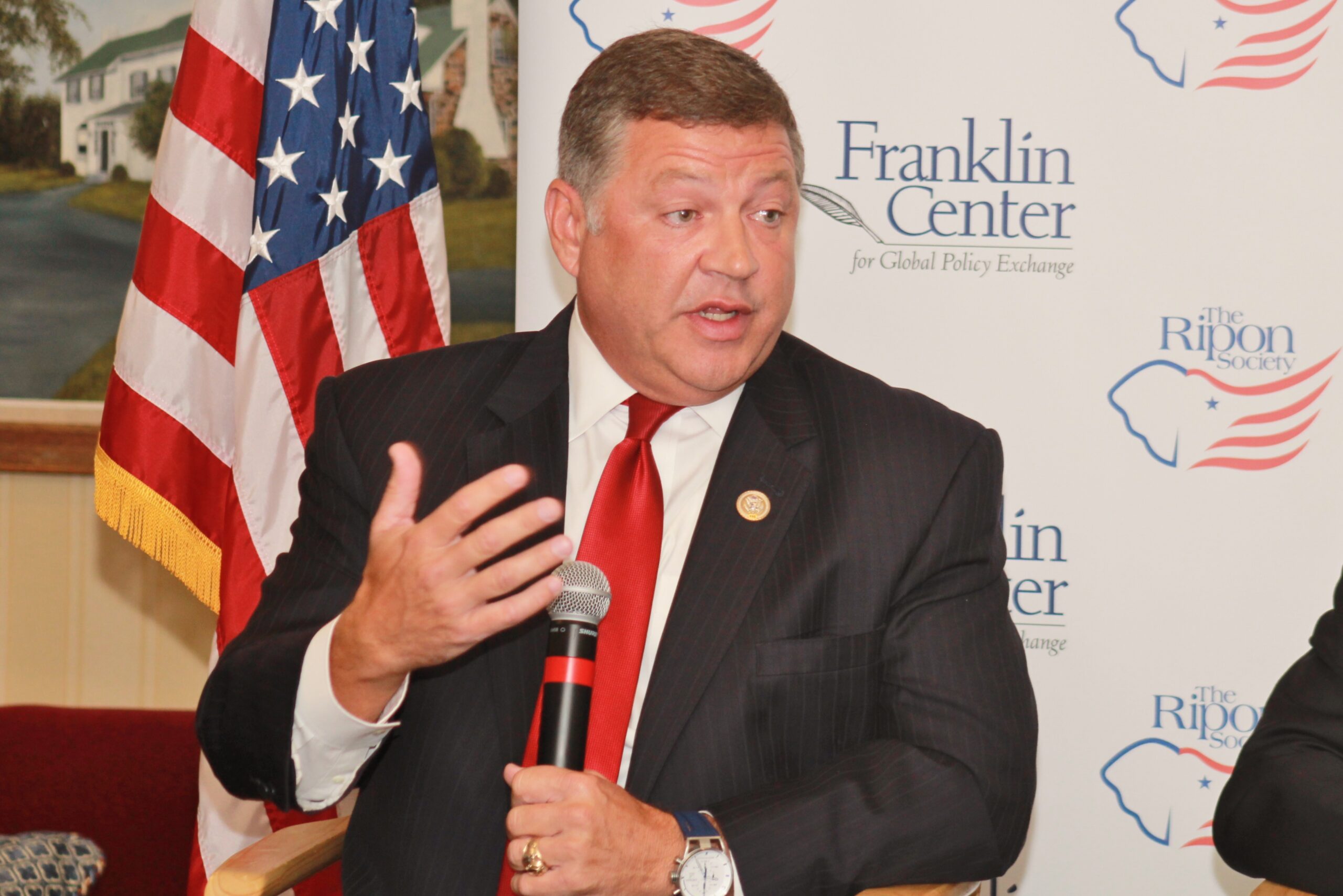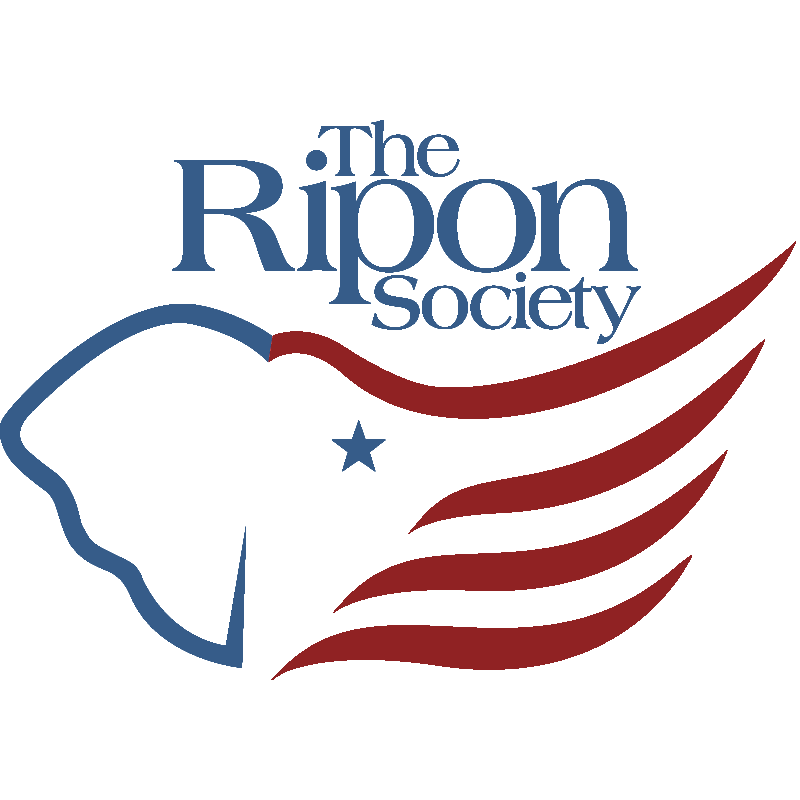 Shuster & DeFazio Work across the Aisle to Rebuild America’s Roads and Bridges
Shuster & DeFazio Work across the Aisle to Rebuild America’s Roads and Bridges
WASHINGTON, DC – The Ripon Society held a breakfast discussion yesterday morning with the Republican and Democratic leaders of the House Transportation & Infrastructure Committee, who discussed the effort to find common ground on a plan to rebuild America’s roads and bridges, and the importace of working across the aisle to achieve that goal.
The leaders were U.S. Rep. Bill Shuster (R/PA-9), who serves as Chairman of the Committee, and U.S. Rep. Peter DeFazio (D/OR-4), who serves as the panel’s Ranking Member. In the spirit of bipartisanship, Chairman Shuster turned to Ranking Member DeFazio to kick off the discussion. The Oregon Democrat opened his remarks by talking about three bills he has introduced that, he said, are intended to not only address some of the problems facing the nation’s infrastructure, but show that both parties can come together on solutions.
“The first one is a no-brainer anywhere except in Washington DC,” DeFazio said of the first bill. “It would spend the Harbor Maintenance Tax on harbor maintenance. Every time you buy an imported good, there is a minuscule ad valorem tax on the value of that good as it comes through the port. Since the Reagan era, that money has purportedly been set aside for harbor maintenance. Unfortunately, every year Congress sees fit to divert almost half of the money into a theoretical trust fund which never gets spent.”
DeFazio said his bill would require that the money be spent only on harbor maintenance. He added that he introduced the bill with Pennsylvania Republican Congressman Mike Kelly, who is a Republican and one of President Trump’s earlier supporters in the House. “I am trying to demonstrate that we can put these things together,” DeFazio declared.
 DeFazio was elected to Congress in 1986. The longest serving House member in Oregon’s history and dean of the State’s Congressional delegation, he has served on the T&I panel since taking office and is one of the foremost experts on transportation issues on Capitol Hill. He is also someone who believes that investment in the area of transportation pays dividends in other areas down the road.
DeFazio was elected to Congress in 1986. The longest serving House member in Oregon’s history and dean of the State’s Congressional delegation, he has served on the T&I panel since taking office and is one of the foremost experts on transportation issues on Capitol Hill. He is also someone who believes that investment in the area of transportation pays dividends in other areas down the road.
To that end, DeFazio said the second bill he has introduced is aimed at shoring up America’s airports.
“The President has repeatedly talked about what dumps our airports are,” he stated. “He probably hasn’t been to the airports in Oregon, because ours are pretty good. But he has probably been in Newark or LaGuardia, and there is a huge unfunded need. A lot of airports are bonded out. In Denver, for instance, they need additional gates to extend their terminals. They have entered into an incredibly innovative P3 (public-private partnership) to rebuild the main terminal. But for the other terminals, they don’t have the funds.”
DeFazio said his bill would address this shortfall by lifting the cap on the passenger facility charge and allow airports to deal with their $34 billion in unfunded needs. He also noted that he introduced the legislation with Kentucky Congressman Tom Massie – also a Republican.
The third bill DeFazio has authored is aimed at finding the funds to rebuild America’s bridges and roads. “In the National highway system,” he noted, “40% of the pavement has peeled to the point where you have to rebuild the roadbed, not just resurface it. We’ve got 140,000 bridges that need substantial repair or replacement.”
To address this funding shortfall, DeFazio’s legislation would index the existing gas and diesel taxes to construction cost inflation and fleet fuel economy. He further noted that while he “didn’t get any Freedom Caucus members” on the bill, it has won the support of Pennsylvania Republican Congressman Lou Barletta.
“So here are three bipartisan bills,” DeFazio continued. “I sent them down to the President and talked to DJ Gribbin and others down there about this package. The funny story is that someone who I know told me that when Elaine Chao heard that I had these three bills, two of them with Freedom Caucus members, she said, ‘I can’t wait till I get home and tell Mitch about that. DeFazio and the Freedom Caucus!’ I am trying to show them there is a way to work together on this stuff. But we’ve got to put substance there.”
Shuster agreed on the need for bipartisanship.
“I think Peter makes the point very well that we’ve got to figure out ways to come together,” the Pennsylvania Republican stated. “Not just on infrastructure, but in a lot of different areas. I believe that our committee over the last four and a half years or so has been able to come together in a bipartisan way to get a number of bills done. Complicated bills, a highway bill, a couple of WRDA bills; and now we’re working on FEMA. We did a Coast Guard bill this year. We’re working on the FEMA bill to tweak it — to make sure that the folks in Texas, in the Southeast and Florida — make sure that the relief is coming to them faster and streamlined so they can get themselves back on their feet as quickly as possible.”
 Shuster was elected to Congress in 2000 and became Chairman of the Transportation and Infrastructure Committee in 2012. He stated that one of his panel’s main goals this year is to reform the Federal Aviation Administration, and noted that he has introduced a plan to achieve that goal.
Shuster was elected to Congress in 2000 and became Chairman of the Transportation and Infrastructure Committee in 2012. He stated that one of his panel’s main goals this year is to reform the Federal Aviation Administration, and noted that he has introduced a plan to achieve that goal.
Shuster further noted that this bipartisan legislation was one of his highest priorities. “I don’t think there’s any disagreement that the FAA needs to be reformed. It’s just how we go about it. It’s obviously a high priority. We were going to have it on the floor this week, but the hurricanes shortened our week and we got some other things on the floor. We intend to come back after the recess and do an extension. We’re working with our counterparts on the Committee to figure out what’s the best timeline for an extension. Then in early October, we’ll move to the floor.”
Shuster also echoed DeFazio about the funding shortfall when it comes to infrastructure and the need to find a new revenue source.
“We have got to figure out how to make the federal investment into our infrastructure,” he stated. “I agree with Peter that there is a federal role, and it’s significant. It’s a national transportation system. Diverting it back to the states or putting it on the states — what you’re going to get is a patchwork of investment … There is a federal role and we’ve got to figure out how to do it. I am open to look at any way, shape, or form of moving forward on how we do that.”
“I think it’s going to take all different kinds of programs and thinking outside the box for how we invest in infrastructure. As Peter said, sending it back to the states is pretty much dead. I think some people are still talking about it, but I don’t think the federal government ought to give up its role in making sure that we have the best interstate highway system in the world. We don’t today because we have not invested.”
Shuster concluded his remarks by commending DeFazio’s bipartisan approach on transportation and saying he hoped the Administration would do the same.
“I encourage the White House to sit down and talk with our counterparts on the other side of the aisle because we are not going to do an infrastructure bill with our Democratic partners unless we pay for it,” the veteran lawmaker declared. “There are different ideas out there. We ought to be looking at everything and bringing our Democratic colleagues on board. Infrastructure is not a Republican or a Democrat issue. It has always been an American issue.”
To view the remarks of Chairman Shuster and Ranking Member DeFazio at The Ripon Society’s breakfast discussion yesterday morning, please click on the link below:
The Ripon Society is a public policy organization that was founded in 1962 and takes its name from the town where the Republican Party was born in 1854 – Ripon, Wisconsin. One of the main goals of The Ripon Society is to promote the ideas and principles that have made America great and contributed to the GOP’s success. These ideas include keeping our nation secure, keeping taxes low and having a federal government that is smaller, smarter and more accountable to the people.



